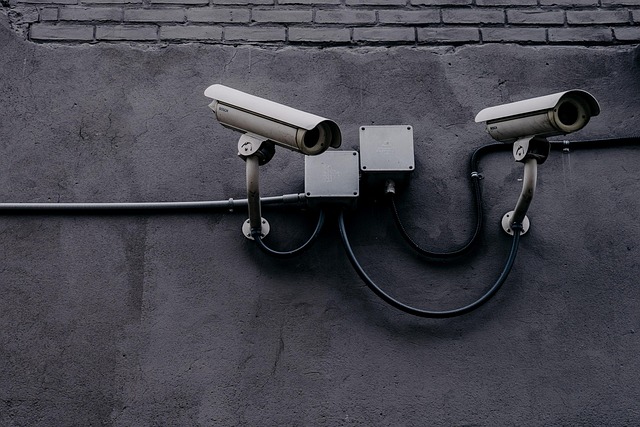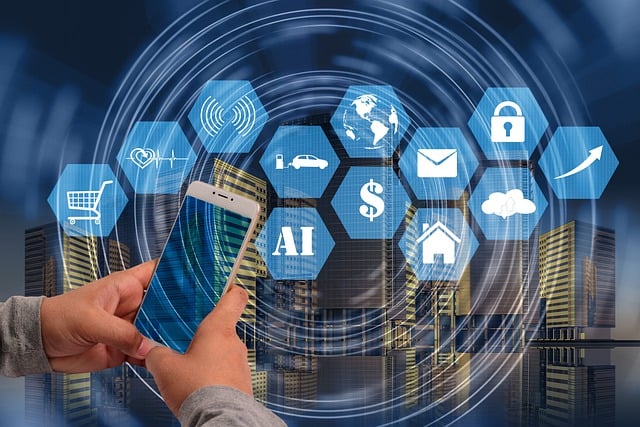AI is revolutionizing home security with advanced, adaptive protection systems. Integrating into modern security tech, AI learns homeowner behaviors, predicts threats, and enhances surveillance through facial recognition & motion detection. These AI-driven solutions offer 24/7 monitoring, personalized alarm settings, and improved accuracy, fostering a comprehensive safety ecosystem. However, challenges around data privacy, bias, and ethical use must be addressed for widespread adoption. With continuous innovation, AI promises an increasingly robust role in safeguarding homes and promoting peace of mind.
Artificial Intelligence (AI) is transforming the landscape of home security, offering unprecedented levels of protection and convenience. Understanding AI’s potential in this domain involves exploring its current applications in safety systems and the benefits it brings to modern security technology. From intelligent cameras to predictive analytics, AI-driven home protection promises enhanced surveillance, faster responses to threats, and improved overall security. This article delves into these advancements, challenges, and the future of AI in safeguarding our homes.
- Understanding AI's Potential in Home Security
- Current Applications of Artificial Intelligence in Safety Systems
- Benefits of AI-Driven Home Protection
- Challenges and Ethical Considerations
- The Future of AI in Modern Security Technology
Understanding AI's Potential in Home Security

The integration of artificial intelligence (AI) into home security systems represents a significant leap forward in modern security technology. AI’s potential to revolutionize home protection is immense, offering advanced capabilities that traditional security measures can’t match. With AI-driven systems, homes can be transformed into intelligent fortresses, capable of detecting and responding to intrusions with unparalleled accuracy and speed.
AI security advancements enable these systems to learn and adapt to homeowners’ behaviors, identifying typical routines and immediately flagging any deviations as potential threats. This level of customization ensures that each home is secured uniquely, accounting for individual lifestyles and preferences. Moreover, AI in home security goes beyond basic surveillance, allowing for proactive protection through predictive analytics, smart automation, and seamless integration with other IoT devices, fostering a comprehensive and connected safety ecosystem.
Current Applications of Artificial Intelligence in Safety Systems

Artificial Intelligence (AI) is playing a significant role in transforming traditional home security systems into modern, advanced protection solutions. One of the key applications is in predictive analytics; AI algorithms can analyze vast amounts of data from various sensors and cameras to identify patterns and potential threats. For instance, these systems can detect unusual activities, like an intruder’s movement, and immediately alert homeowners or authorities. This real-time response capability enhances safety significantly.
Additionally, AI improves security through facial recognition technology, enabling accurate identification of authorized individuals and denying access to unauthorized persons. Voice command control is another trend, allowing users to activate or deactivate security measures remotely using natural language commands. These advancements in AI security demonstrate the potential for enhanced home protection, offering peace of mind for homeowners in today’s digital age.
Benefits of AI-Driven Home Protection

The integration of Artificial Intelligence (AI) into home security systems has revolutionized modern security technology. AI-driven home protection offers a myriad of benefits, enhancing safety and peace of mind for homeowners. These advanced systems can analyze patterns and behaviors, detecting anomalies that might indicate potential threats. This capability allows for faster response times to intruders or suspicious activities, making AI an invaluable asset in preventing property damage and personal harm.
AI security advancements enable intelligent monitoring through 24/7 surveillance, equipped with facial recognition technology and motion detection. Such features ensure that every corner of the home is secured. Moreover, these systems can adapt to individual routines, learning patterns and adjusting alarm settings accordingly. This personalized approach to home protection ensures that safety measures are tailored to specific needs, contributing to a safer living environment.
Challenges and Ethical Considerations

The integration of Artificial Intelligence (AI) into home security systems presents a promising future for enhanced protection and peace of mind for homeowners. However, along with its potential benefits, AI in this context also brings about several challenges and ethical dilemmas that require careful consideration. As AI-driven technology becomes more prevalent in everyday life, ensuring the responsible use of such advanced systems is essential.
One primary concern is data privacy and security. Smart home devices equipped with AI often collect vast amounts of personal information, from daily routines to biometric data. Protecting this sensitive data from unauthorized access or misuse is crucial. Additionally, bias in algorithms, which can lead to inaccurate assessments or discriminatory outcomes, is an ethical worry. With AI making decisions about security alerts and potential threats, ensuring fairness and transparency in its operations is vital to maintaining trust among users. Navigating these challenges will be key in the widespread adoption of modern security technology powered by artificial intelligence.
The Future of AI in Modern Security Technology

The future of AI in modern security technology looks promising, with continuous advancements pushing the boundaries of what’s possible. Artificial intelligence is increasingly becoming a cornerstone of home security systems, offering sophisticated protection that adapts and learns from various environments. AI-driven algorithms can analyze patterns, detect anomalies, and predict potential threats, enhancing the responsiveness and accuracy of security measures. For instance, AI cameras equipped with advanced computer vision capabilities can identify familiar faces, pets, or vehicles, distinguishing them from intruders, thereby reducing false alarms.
As technology evolves, we can expect even smarter integration, where AI not only monitors but actively participates in home security. From predictive analytics that anticipate potential risks to autonomous response mechanisms, the role of AI in ensuring safety is set to become more prominent. These innovations promise to create a robust and adaptive security ecosystem, making homes safer than ever before.






